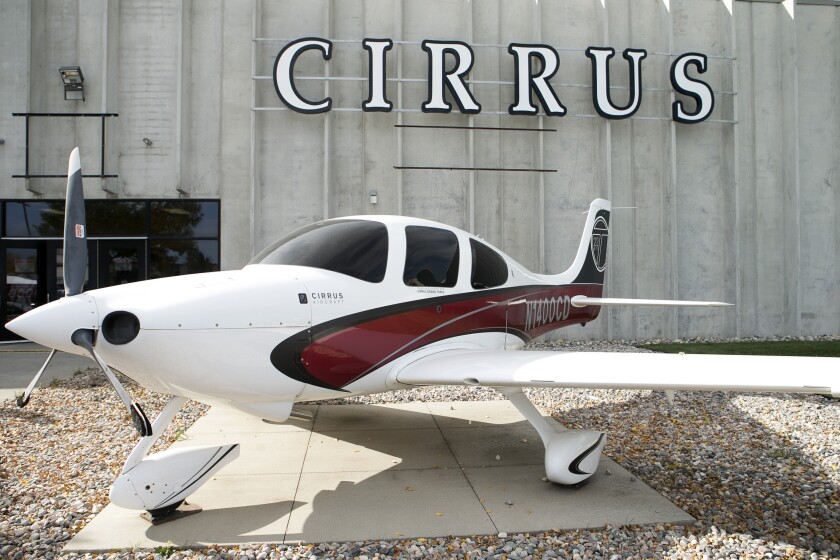GRAND FORKS — Cirrus Aircraft, the Duluth-based manufacturer with a location in Grand Forks, started the pandemic in a rough place.
The uncertainty is hard to remember now — nearly a year and a half later — but there was an extraordinary sense that the country and its economy were entering uncharted territory. At Cirrus Aircraft, the future looked uncertain.
ADVERTISEMENT
And so the belt-tightening began. Patrick Sniffen, the company’s marketing director, said Cirrus was worried demand might slacken (a fellow company leader has pointed out supply chain issues). In preparation for that possibility, the company .
“But what we quickly realized is that the pandemic had an interesting effect in that demand didn’t decline,” Sniffen said in August. “In fact, it went up.”
As COVID throttled traditional travel, the market for private airplanes surged, driven by customers who likely wanted to avoid the hassle and danger of a mid-pandemic airport. Sniffen points out that, especially in more remote areas, it was harder to get a flight.
“The airlines may have cut schedules to smaller airports. A lot of the regionals (airlines) got hit pretty hard, and they furloughed pilots and they put planes on mothballs and so on and so forth,” he said. “So for folks that aren’t being served by major aviation hubs … this is the perfect tool to get there.”
Now, Sniffen said, the company sees a brighter future. Cirrus was recruiting for roughly 250 positions when he spoke in August. At the company’s Grand Forks location, there were 273 employees in early March 2020. Now, he said, there’s 305 employees, and approximately 20 openings.
And demand is giving the broader industry a tailwind, too.
“There's not a manufacturer out there that I deal with on a daily basis that isn't sold out for the next 18 months,” said Tom Hauge, the national sales director for Wings Insurance. “Inventory levels are down, backlogs are substantial. If you want to buy a new airplane today, good luck.”
ADVERTISEMENT
That’s reflected in some of the most recent state figures on airplane sales, which have boomed in the last several years. The excise taxes the state of North Dakota collects on private aircraft transactions was up to $5.5 million and counting this spring, far above anything seen in the past decade. The number of individual transactions was at a high.
It’s a bright moment for Cirrus Aircraft, which has had a decades-long relationship with the city of Grand Forks. It tried to bring manufacturing work into the community in 1992, but after a slow deal-making process with the state and the city, it instead settled on Duluth, where it’s now headquartered.
The fallout from failing to win Cirrus’ business was immediate. A top state Democrat said Republican Gov. Ed Schafer showed a “failure of leadership” in letting the opportunity fall through. Days later, Schafer flew into Minneapolis, hat in hand, with a top economic aide and the dean of UND’s aerospace school in tow, to help understand their mistake.
Much of the slow deal-making process that hampered efforts to bring Cirrus to Grand Forks happened in 1992, during Gov. George Sinner's administration and before Schafer became governor. The deal collapsed entirely in the spring of 1993, though, after Schafer had been governor for months and had touted a state sales tax break to help entice the company to come to North Dakota.
"We have to be deal-makers and not just road-blockers," Schafer said.
Almost 30 years later, that chapter from Grand Forks’ history is a tantalizing what-if. How many more jobs might be in Grand Forks today if things had gone differently? That’s impossible to know.
But Cirrus, of course, did bring business to town. And in the years since, the company has grown its presence to include hundreds of employees and a production facility that makes airplane components. A marquee area employer, Cirrus bought the city-owned 200,000-square-foot facility in the industrial park for about $1.9 million late last year.
ADVERTISEMENT
“We’ve seen highs and we’ve seen lows, but we’ve always stuck it out with one another and have found ways to continue to move forward together,” City Administrator Todd Feland said.
And the failed early 1990s deal is impossible to imagine in Grand Forks today. Federal job figures and U.S. Census Bureau numbers show the city is struggling to match the growth of Fargo and Bismarck. And Grand Forks — hungry for more workers and more opportunity — likely won’t miss a chance like that again.
The city is scrambling right now to apply for state funding for a career and technical center; it’s regularly offering new businesses tax incentives to help bring them into town. And Feland recently wondered aloud about going even further, and whether the community should build move-in ready space to entice new businesses to come to the area. It’s not clear how that could happen — but the concept is enticing.
“What we often hear is there’s businesses that want to come into our community. Whether they’re logistics or manufacturing, they need a location,” Feland said. “... The one thing we’ve thought about is, should we go beyond that next step, of having infrastructure-ready land, to have spec buildings?”
It’s hard to know how much longer the aviation industry’s glut of demand will last. Part of the answer will depend on the coronavirus, and the extremely contagious delta variant — not to mention Americans’ interest in the vaccine.
“I don't have a crystal ball," Hauge said.
But as for the demand he’s seeing right now: "It's just going to be good for our industry."
ADVERTISEMENT
EDITOR'S NOTE: This story was updated Oct. 13, 2021, to clarify the efforts to bring Cirrus to Grand Forks in the early 1990s.









